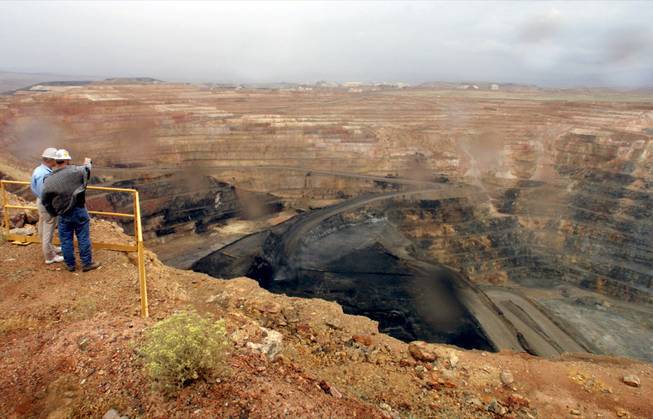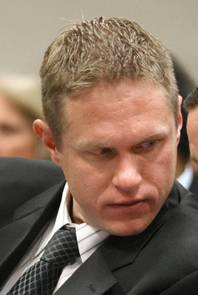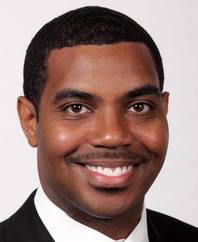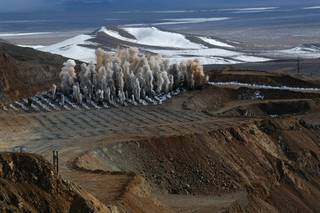
An open pit gold mine, part of a complex near Carlin, is shown in this 2009 file photo. Tim Crowley, president of the Nevada Mining Association, says mining companies have been deducting expenses from their tax bills that may not be authorized by state law.
Sunday, April 17, 2011 | 2:05 a.m.

Chris Nielsen

Steven Horsford
Sun archives
- Nevada legislators scrutinize mining tax breaks (4-7-2011)
- Mining lobbyists avoid provoking hostile lawmakers in tax debate (4-5-2011)
- Democrats seek to repeal mining tax from the constitution (3-28-2011)
- Steven Horsford calls on Nevada regulators to close mining tax loopholes (3-21-2011)
- Sandoval calls emergency meeting of tax commission to review lax audits of mining companies (3-14-11)
- Sandoval removes tax department director after failure to audit mining companies (3-1-11)
- Sandoval administration has no auditors trained to scrutinize mining industry’s tax deductions (3-10-11)
- Obama proposal for new mining fees puts Harry Reid in tough spot (2-14-2011)
- Is low-taxes sales pitch enough to bring businesses to Nevada? (2-11-2011)
- Gaming, mining industries become early targets for taxes (2-8-2011)
Nevada mining companies have been deducting, with regulators’ approval, a slew of expenses from their tax bills that may not be authorized by state law, the president of the Nevada Mining Association acknowledged in a letter to the state tax director last week.
In the letter obtained by the Las Vegas Sun, Tim Crowley, president of the Nevada Mining Association, identified three categories of deductions taken by the industry and allowed by regulators that appear to conflict with state law governing the net proceeds on minerals tax.
That law allows mining companies to deduct expenses directly related to extracting minerals from the ground and processing them into a product ready for sale.
Crowley testified in a recent legislative hearing, “anything that doesn’t pass that litmus test, it’s not deductible.”
But in his letter to Tax Director Chris Nielsen, Crowley said a review by mining industry accountants found regulators are approving questionable deductions. Some of those deductions are not specifically mentioned in state law but are allowed through written regulations approved by state lawmakers.
Other deductions are not mentioned in either state law or written regulations, but have been allowed by tax officials just the same.
Regardless, many of those deductions are not related in any way to the extraction and processing of the ore — failing the ultimate legal test of an allowable a deduction, Crowley admitted in the letter.
State officials should reconsider those deductions, Crowley wrote: “Please understand that, to the best of their ability, association members comply with the statutes and regulations administered by the tax department. Our review has generated three categories for expenses worthy of reconsideration.”
According to the association’s review, the industry is allowed under regulations to deduct expenses for employee housing, exploration, corporate costs and fees paid to the World Gold Council, a marketing organization for the industry.
Those deductions are not mentioned in state law.
The industry has also been allowed to deduct miscellaneous travel expenses for training and to visit vendors, costs that Crowley wrote “may not be relevant to the value of the mineral.”
The association also questioned whether it’s appropriate to deduct employee severance costs, which Crowley stated bluntly have “little to do with the current minerals being extracted.”
Both the travel and severance costs do not appear in either written regulations or state law as allowable deductions.
Neither Crowley nor Nielsen could explain why those costs were allowed by regulators.
“In no way have we taken deductions that aren’t allowed by the (Tax) Commission,” Crowley said. “But we know there is going to be a discussion (about what deductions should be allowed) and we encourage it. We think it’s healthy.”
The commission signs off on state tax regulations and oversees the Department of Taxation.
The mining industry has come under increasing scrutiny and pressure from lawmakers and the public, who argue the state’s lone booming industry in the recession should contribute more in taxes to help the state with its crippling budget shortfall.
Lawmakers are considering legislation that would cut the industry’s deductions by nearly two-thirds and another bill that would eliminate the industry’s constitutional tax protections, in place since statehood.
How much in additional taxes the state could receive from the mining industry with revamped deductions is unclear. But under Assembly Bill 428, which would cut deductions by 60 percent, the state would net about $81 million in additional revenue.
Senate Majority Leader Steven Horsford, D-North Las Vegas, has also petitioned the Tax Commission to rewrite the regulations, which he says allow mining companies to make unauthorized deductions.
The commission is expected to make a decision on his petition during a special meeting Monday.
Nielsen was reluctant to comment on Crowley’s letter, saying it will be discussed publicly during the meeting. But he disagreed with the assertion that regulators are allowing deductions that are not specified in either regulations or state law.
“To my knowledge that is not occurring,” he said.
Nielsen also noted that tax auditors disallowed more than $74 million in deductions the industry attempted to claim in 2009, netting the state about $4 million more in tax revenue.
In response to Horsford’s petition, the association assembled a committee of accountants and other industry professionals to review regulations and deductions to determine whether they truly reflect the costs of extracting and processing minerals, Crowley said.
Industry lobbyists have strenuously fought the bill to cut their deductions, arguing it would artificially inflate the value of the property being taxed. But they’ve signaled a willingness to review individual deductions to evaluate whether they are appropriate, which could result in a higher tax bill for the industry.
“We wouldn’t have put it out there if we didn’t think it’s not clear, and it’s not clear,” Crowley said. “Let’s clarify it. Let’s go through it and decide, ‘is this in or is this out?’ If we were just going to go into defense mode, we wouldn’t have written a letter.”



Join the Discussion:
Check this out for a full explanation of our conversion to the LiveFyre commenting system and instructions on how to sign up for an account.
Full comments policy